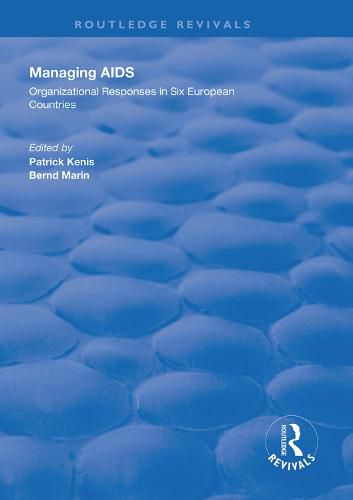Readings Newsletter
Become a Readings Member to make your shopping experience even easier.
Sign in or sign up for free!
You’re not far away from qualifying for FREE standard shipping within Australia
You’ve qualified for FREE standard shipping within Australia
The cart is loading…






First published in 1997, this volume examines how, in the last 15 years, HIV/AIDS has become a challenge for public health, public policy and research. Reducing further HIV transmissions as well reducing the personal and social impact of HIV/AIDS requires a wide range of activities developed by a wide range of organizations - the supply of which varies widely between countries, regions and social groups.
The book describes the programmes which seem particularly effective in dealing with HIB/AIDS and sets out to explain the disparities in their distribution. It documents and tries to understand both similarities as well as the variety of national approaches taken to cope with HIV/AIDS in a number of European countries. On the basis of the welfare-mix model, six country studies and an introductory chapter draw particular attention to the different mixes of public policies and private non-profit, community-based activities; the functional mixes between different types of services in the areas of prevention, care, research, control and monitoring, interest representation, fund-raising. The mixes between specialized, so-called exclusive HIV/AIDS service organizations and services made available by general, comprehensive, or so-called inclusive institutions which provide AIDS-specific programmes among other activities will also be elaborated. The whole range of HIV/AIDS activities, from professional services to self-help, is analysed in a comparative perspective.
The book is based on data from the European Centre / WHO Collaborative Study Managing AIDS. It is a comparative policy study focused on the role of non-profit organizations in public health and welfare policy, covering several thousands of organizations and HIV/AIDS programmes in six European countries.
Unexpected similarities and divergence in AIDS service organizations across Europe were found. The sheer multitude of programmes offered called a surprise to experts in the field, as did remaining conspicuous blank spots or deficiencies in services. Degrees of AIDS policy coherence, prevention efforts, service density and quality, self-help and professionalization, medicalization vs. social integration of HIV/AIDS programmes, sectoral specialization and institutionalization all vary tremendously, as do the efficiency and effectiveness of organizational responses to HIV/AIDS. Interestingly, variations in the supply of activities can hardly be explained by epidemiological patterns and corresponding demand and needs.
AIDS management requires long-term institutional strategies and information which cannot be provided by epidemiological or behavioural analysis alone. An effective struggle against HIV/AIDS also requires institution-building, inter-organizational development and policy-field analysis.
$9.00 standard shipping within Australia
FREE standard shipping within Australia for orders over $100.00
Express & International shipping calculated at checkout
First published in 1997, this volume examines how, in the last 15 years, HIV/AIDS has become a challenge for public health, public policy and research. Reducing further HIV transmissions as well reducing the personal and social impact of HIV/AIDS requires a wide range of activities developed by a wide range of organizations - the supply of which varies widely between countries, regions and social groups.
The book describes the programmes which seem particularly effective in dealing with HIB/AIDS and sets out to explain the disparities in their distribution. It documents and tries to understand both similarities as well as the variety of national approaches taken to cope with HIV/AIDS in a number of European countries. On the basis of the welfare-mix model, six country studies and an introductory chapter draw particular attention to the different mixes of public policies and private non-profit, community-based activities; the functional mixes between different types of services in the areas of prevention, care, research, control and monitoring, interest representation, fund-raising. The mixes between specialized, so-called exclusive HIV/AIDS service organizations and services made available by general, comprehensive, or so-called inclusive institutions which provide AIDS-specific programmes among other activities will also be elaborated. The whole range of HIV/AIDS activities, from professional services to self-help, is analysed in a comparative perspective.
The book is based on data from the European Centre / WHO Collaborative Study Managing AIDS. It is a comparative policy study focused on the role of non-profit organizations in public health and welfare policy, covering several thousands of organizations and HIV/AIDS programmes in six European countries.
Unexpected similarities and divergence in AIDS service organizations across Europe were found. The sheer multitude of programmes offered called a surprise to experts in the field, as did remaining conspicuous blank spots or deficiencies in services. Degrees of AIDS policy coherence, prevention efforts, service density and quality, self-help and professionalization, medicalization vs. social integration of HIV/AIDS programmes, sectoral specialization and institutionalization all vary tremendously, as do the efficiency and effectiveness of organizational responses to HIV/AIDS. Interestingly, variations in the supply of activities can hardly be explained by epidemiological patterns and corresponding demand and needs.
AIDS management requires long-term institutional strategies and information which cannot be provided by epidemiological or behavioural analysis alone. An effective struggle against HIV/AIDS also requires institution-building, inter-organizational development and policy-field analysis.